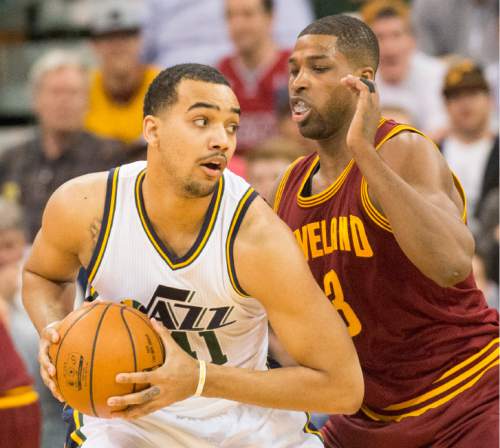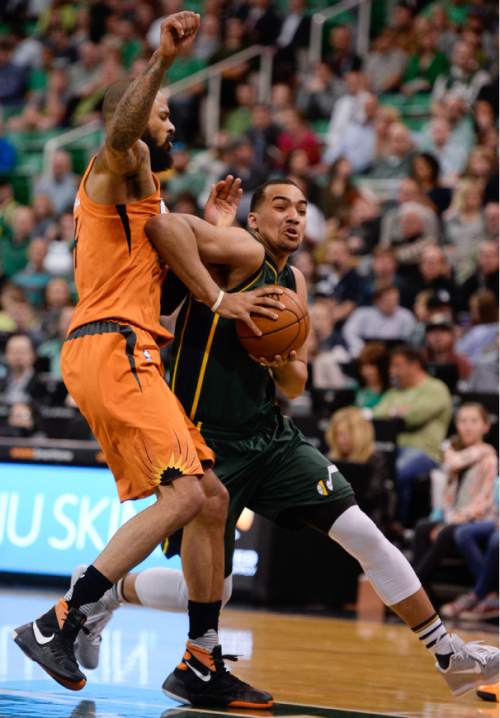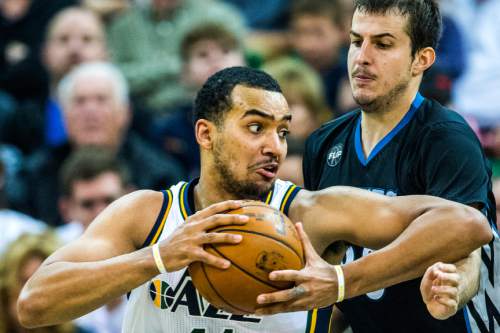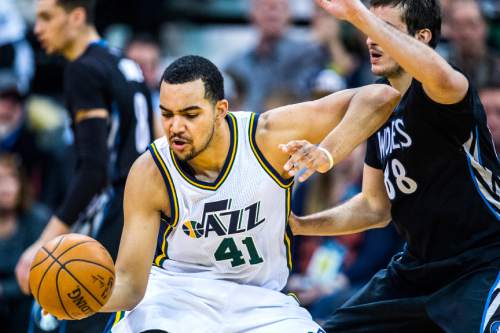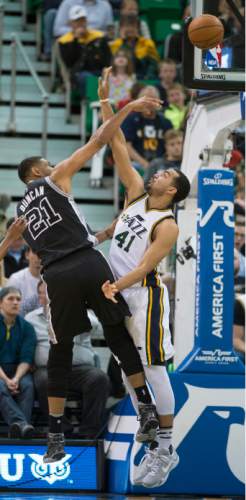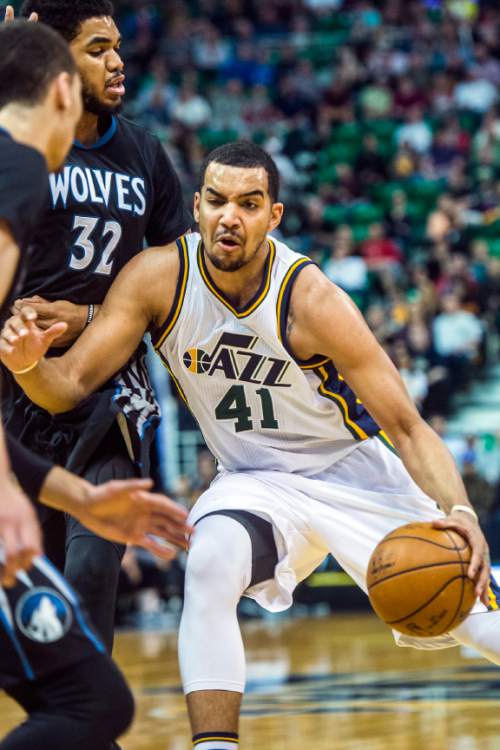This is an archived article that was published on sltrib.com in 2016, and information in the article may be outdated. It is provided only for personal research purposes and may not be reprinted.
At the end of a ruptured season, a season that twisted and blew out knees, wrenched backs, fractured fibulas, sprained ankles, and that, ultimately, as Derrick Favors put it, broke the Jazz's heart, there is a bit of positivity.
His name is Trey Lyles.
If the advance the power forward made in his rookie season is the truth — no reason to believe it wasn't — and that progress continues near the same rate heading into 2016-17, the Jazz have found themselves an unselfish contributor, a gluey force that not only will help them by way of his own prowess, with his burgeoning individual abilities, but also via his general outlook on the game, his view on how it should be played, how it should be shared.
With San Antonio as a major influence on Dennis Lindsey's vision for what the Jazz should become, Lyles is a Spurs kind of player. He's versatile and generous, willing to make his own moves and take his own shots, but wanting to make the other guys look good, too.
It's an approach rare for a 20-year-old and not all that common for players with a whole lot of rings around their trunks. Some of it is innate, some of it assimilated. Before he ever came to the Jazz, in his year at Kentucky, Lyles played out of position — at small forward — for the general welfare of the team. His mindset and his talents allowed him to do so.
When the Jazz selected him 12th in last year's draft, they liked his size — 6-foot-10, 235 pounds — and his multifaceted skills, his ability to handle and pass the ball and projected his deep range as a stretch. When they first got him on the floor, though, there were times when little of what they thought they liked and projected was evident.
Lyles looked lost.
His teammates noticed, and sometimes wondered themselves about the kid's qualifications.
"It's a pretty big jump when you go from playing against 18-, 19-, 20-year-olds and now you're going against 30-year-old men who have played in the league a long time," Lyles said. "That's different. I've just had to learn and stay prepared. At the beginning, everything was faster, but, once you get used to it, you get a little more comfortable. You start to understand what you're supposed to do, and then it slows down and you can process it a little better."
So he did.
Early on, as hints of his talents surfaced, they then slipped under the waves again. That emerging-submerging routine lasted throughout, with the periods of emerging elongating and the submerging shortening.
"Trey, from how he was playing at the beginning, to where he is now, he's gotten a lot better," Rudy Gobert said, not meaning to sledgehammer the critical condescension. "His confidence is greater. He's got a bright future."
Added Shelvin Mack: "He's a confident kid now. He knows he can play at this level."
As mentioned, the NBA acclimation was not automatic. Not on the floor during games, not through everything that came in-between. Initially, Lyles was tentative shooting the corner 3, tentative in his movements, tentative with his midrange game. He was mostly good off the dribble, looking to create for himself and his teammates, but the aggression and accuracy that came in time were his greatest upgrades. His rebounding improved, his defense is still under construction. He's still green, but his growth, his decisiveness has been notable.
Nobody's sure his talents will make him a huge star, but Lyles will play and prosper with his game.
"It's been a big adjustment from college, a lot more practice days, a lot more games, a lot more traveling, having to stay on top of taking care of myself," Lyles said. "I've learned a lot, becoming more comfortable and having more confidence from putting in the work. You have to work really hard. I had to continue to work on things, do everything you do to the best of your abilities."
Lyles got minutes as injuries to Favors and others piled up. He played in 80 games and started 33. By the end of the season, he averaged just more than 17 minutes, scoring 6.1 points and gathering 3.7 rebounds. His overall field-goal percentage was 44, and his 3-point percentage 38.
The numbers weren't great, but the glimpses were.
An example: In the 80th game of the season, with the Jazz still battling for a playoff spot on the road against Denver, when Favors was scratched on account of a sore knee, Lyles started, and then finished with 22 points on 9-for-16 shooting, including four bombs. He played like those 30-year-old men.
All right, he said, no big surprise.
"I definitely thought I could be good," said Lyles. "I've been confident, and putting in the endless work, it pays off. That's something I continued to do. I've gone to the gym before practice or after it, making sure I do what I have to do. I've worked on everything — shooting, ball-handling, making plays, reading defenses, trying to play better defense, being more physical, knowing where my teammates like to get the ball, all of those things.
"I feel pretty good about my future."
He should.
GORDON MONSON hosts "The Big Show" with Spence Checketts weekdays from 3-7 p.m. on 97.5 FM and 1280 AM The Zone. Twitter: @GordonMonson.


